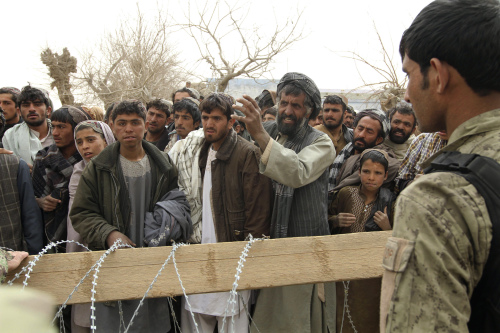WASHINGTON (AP) ― President Barack Obama has a public relations problem when it comes to Afghanistan, to say the least.
Once the must-fight war for America, the decade-long mission has spiraled into a series of U.S. missteps and violent outbreaks that have left few ardent political supporters. After NATO detained a U.S. soldier Sunday for allegedly killing sleeping Afghan villagers, Republicans and Democrats alike pointed to the stress on troops after years of fighting and reiterated calls to leave by the end of 2014 as promised, if not sooner.
“It’s just not a good situation,’’ said Senate Majority Leader Harry Reid. “Our troops are under such tremendous pressure in Afghanistan. It’s a war like no other war we’ve been involved in. ... We’re moving out, as the president said. I think it’s the right thing to do.’’
Likewise, many Republicans ―who as a party fought against a quick exodus from Iraq and criticized Obama’s 2008 presidential campaign promise to end the war ― are now reluctant to embrace a continued commitment in Afghanistan.
“There’s something profoundly wrong with the way we’re approaching the whole region, and I think it’s going to get substantially worse, not better,’’ said Republican presidential hopeful Newt Gingrich. “I think that we’re risking the lives of young men and women in a mission that may, frankly, not be doable.”
American voters appear frustrated as well. In results from a Washington Post-ABC News poll released Sunday, 55 percent of respondents said they think most Afghans oppose what the United States is trying to do there. And 60 percent said the war in Afghanistan has been “not worth fighting.”
 |
An Afghan soldier speaks to civilians gathered outside a military base in Panjwai, Kandahar province south of Kabul, Sunday. (AP-Yonhap News) |
The latest incident in Afghanistan was disturbing: At 3 a.m. Sunday, an American staff sergeant from Joint Base Lewis-McChord, Washington state, allegedly wandered 500 yards (450 meters) from his base in the southern Kandahar province and begun shooting villagers as they slept. As many as 16 Afghans were killed, including nine children, before the shooter apparently returned to base and turned himself in.
One eyewitness described the body of a young boy, apparently wearing red pajamas, lying lifeless in the back of a minibus. That and other searing images, including an AP photographer’s confirmation of burned bodies at the scene, easily eclipsed Friday’s upbeat announcement that the U.S. and Afghanistan had agreed on the transfer of Afghan detainees to Afghan control.
Obama and top U.S. officials quickly condemned the attack and offered their condolences to families of the victims. Obama and Defense Secretary Leon Panetta called Afghan President Hamid Karzai, both vowing to hold any perpetrators accountable.
Their statements stopped short of a full apology but appeared to want to ward off any retaliatory attacks, like those seen recently after U.S. officials acknowledged the burning of Muslim holy books at an air base in Afghanistan. Six U.S. service members were killed in attacks immediately following that revelation, including two American officers who were assassinated while working inside a heavily protected Afghan government ministry in Kabul.
“This deeply appalling incident in no way represents the values of (U.S. and coalition troops) or the abiding respect we feel for the Afghan people,” Gen. John Allen, the top U.S. commander in Afghanistan, said Sunday. “Nor does it impugn or diminish the spirit of cooperation and partnership we have worked so hard to foster with the Afghan National Security Forces.”
But the damage is probably inevitable. Pulling no punches, Karzai called the shooting an “assassination” and “an intentional killing of innocent civilians” that could not be forgiven.
For their part, U.S. officials pointedly noted that the suspect would be tried under U.S. law, a fine point perhaps made to head off any demands by Karzai that Afghanistan be given custody of the soldier.
The tension could be enough to raise a key question among Obama’s top advisers as they stare down this fall’s bid for re-election: Should Obama press NATO to speed up its scheduled transfer of security responsibility to the Afghan government at the end of 2014?
Panetta has already said he hopes Afghans will assume the lead combat role across the country by mid-2013, with U.S. and other NATO troops remaining in smaller numbers to perform numerous support missions. U.S. and Afghan officials have said they want a strategic partnership agreement signed by the time a NATO summit convenes in Chicago in May.
Further complicating the matter is the limited patience many of Obama’s top supporters have for Karzai.
“The great weakness in Afghanistan is Karzai,’’ said Sen. Chuck Schumer, a New York Democrat. “Nobody seems to trust him or like him. And the idea of turning it over to the Afghan forces is the right way to go, but that’s a major question mark: Karzai.”
Sen. John McCain, the top Republican on the Senate Armed Services Committee, pleaded for public patience on the war.
“I understand the frustration, and I understand the anger and the sorrow,” McCain said. “I also understand and we should not forget that the attacks on the United States of America on 9/11 originated in Afghanistan. And if Afghanistan dissolves into a situation where the Taliban were able to take over a chaotic situation, it could easily return to an al-Qaida base for attacks on the United States of America.”
Sen. Lindsay Graham, a South Carolina Republican, said a primary problem is leaving the country vulnerable and signaling to Iran that the U.S. wasn’t committed to the region.
“We can win this thing. We can get it right,’’ Graham said.
Reid spoke on CNN’s “State of the Union.” Graham and Schumer spoke on ABC News “This Week.” McCain spoke on “Fox News Sunday.”








